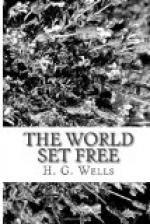‘If,’ he whispered, ‘if only we could pick that lock. . . .’
The sun was sinking over the distant hills. Already it was shorn of its beams, a globe of ruddy gold, hanging over the great banks of cloud that would presently engulf it.
‘Eh!’ said the youngster. ‘Eh!’
He seemed to wake up at last out of his entrancement, and the red sun was there before his eyes. He stared at it, at first without intelligence, and then with a gathering recognition. Into his mind came a strange echo of that ancestral fancy, that fancy of a Stone Age savage, dead and scattered bones among the drift two hundred thousand years ago.
‘Ye auld thing,’ he said—and his eyes were shining, and he made a kind of grabbing gesture with his hand; ’ye auld red thing.... We’ll have ye yet.’
CHAPTER THE FIRST
THE NEW SOURCE OF ENERGY
Section 1
The problem which was already being mooted by such scientific men as Ramsay, Rutherford, and Soddy, in the very beginning of the twentieth century, the problem of inducing radio-activity in the heavier elements and so tapping the internal energy of atoms, was solved by a wonderful combination of induction, intuition, and luck by Holsten so soon as the year 1933. From the first detection of radio-activity to its first subjugation to human purpose measured little more than a quarter of a century. For twenty years after that, indeed, minor difficulties prevented any striking practical application of his success, but the essential thing was done, this new boundary in the march of human progress was crossed, in that year. He set up atomic disintegration in a minute particle of bismuth; it exploded with great violence into a heavy gas of extreme radio-activity, which disintegrated in its turn in the course of seven days, and it was only after another year’s work that he was able to show practically that the last result of this rapid release of energy was gold. But the thing was done—at the cost of a blistered chest and an injured finger, and from the moment when the invisible speck of bismuth flashed into riving and rending energy, Holsten knew that he had opened a way for mankind, however narrow and dark it might still be, to worlds of limitless power. He recorded as much in the strange diary biography he left the world, a diary that was up to that particular moment a mass of speculations and calculations, and which suddenly became for a space an amazingly minute and human record of sensations and emotions that all humanity might understand.
He gives, in broken phrases and often single words, it is true, but none the less vividly for that, a record of the twenty-four hours following the demonstration of the correctness of his intricate tracery of computations and guesses. ‘I thought I should not sleep,’ he writes—the words he omitted are supplied in brackets—(on account of) ’pain in (the) hand and chest and (the) wonder of what I had done.... Slept like a child.’




